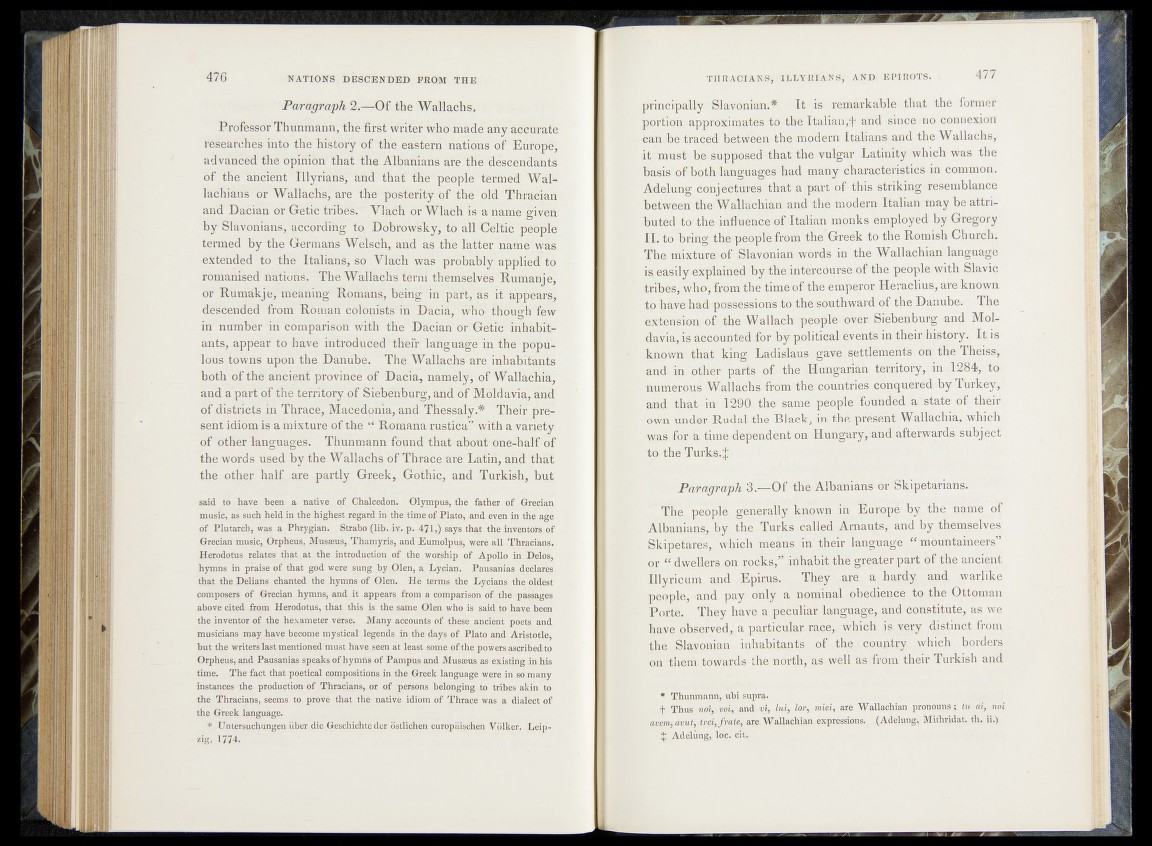
Paragraph 2.—Of the Wallachs.
Professor Thunmann, the first writer who made any accurate
researches into the history of the eastern nations of Europe,
advanced the opinion that tli« Albanians are th é 'descendants
of the ancient Illyrians, and that the people termed Wal-
lachians or Wallachs, are the posterity of the old Thracian
and Dacian or Getic tribes. Vlach orWlach is a name given
by Slavonians, according to Dobrowsky, to all Celtic 'plople'
termed by the Germans Welsch, and as the latter name was
extended to jthe Italians, so Vlach was probably applied to
romanised nations. The Wallachs terhi themselves Rumanjè,
or Rumakje, meaning Romans, being in part, a ! ’appears,
descended from Roman 'colonists'm Dacia,' wlio Ihough few
in number in comparison with the Dacian Of Gctic inhabitants,
appear to have introduced their language in the populous
towns upon the Danube. The Wallachs are inhabitants
both of the ancient province of Dacia, namely; of Wallachra,
and a part of the territory of Siebehburg, and of Moldavia’, add
qf districts in Thrace, Macedonia, and Thessaly.^ Tlieir^pre?,
sent idiom is a mixture of the “ Romana rustica”'with a variety
of other languages. Thunmann found that abdht^öne-hklf of
the words used by the Wallachs of Thrace are Latin, äh (Pth at
the other half are partly Greek, Gotlng,- and -Turkish, but
said to have been a native of Chalcedon. Olympus, the father of Grecian
muslin as such held in. the highest regard in the time ofTlato, and even in .the age
of Plutarch, was a Phrygian. Strabo (lib. iv. p, 471,) says that the inventors of
Grecian music, Orpheus, Musasus, Thamyrig, andEuxpolpus, were all Thracians,
Herodotus relates that at the introductionfc6g the. worship of ^poljo in Delos,
hymns in praise of that god were sung hy^Olen, aTLycian, Pausanias deplores
that the Delians chanted the hymns of Olen. He’ terms the Lycians the oldest
composers of Grecian hymns, and it appears, from a comparison of .the passages
above cited from Herodotus, that this is the same Olen who is said to hayg been
the inventor of the hexameter verse. Many accounts of these ancient poets and.
musicians may have become mystical legends in the days of Plato and Aristotle,
hut the writers last mentioned must have seen at least some of the powers ascribed to
Orpheus, and Pausanias speaks of hymns of Pampus and Musaeus as existing in his
time. The fact that poetical compositions «! the Greek language were in so many
instances- the production of Thracians, or of persons belonging-to tribes akin to
the Thracians, seems to prove that the native idiom of Thrace was a dialect of
the Greek language.
*, Untersuchungen über die Geschichte der östlichen europäischen Volker. Leipzig,
1774.
principally Slavonian.* It is remarkable that the former
portion approximates to the Italian,f* and since no connexion
can be traced between the modern Italians and the Wallachs,
it mUst^b^supposed that the vulgar Latinity which was the
basis.-of both languages had many characteristics in common.
Adelung c©T^eetdytJs. that a part of this 'striking resemblance
between the Wallachian and the modern1 Italian may be attributed
to-the influen'be4f Italian monks employed by Gregory
II, to brfng‘the«pep?pl% froth tlie Greek Tqtile Romish Church.
The mixture* of Slavonian words in the Wallachian language
is easily explained byAhe intercdur'S'e'sjQf the people with Slavic
tribes,, who, from the’ timefefMh©*emperor HerbcMais, are'known
to have-had possessions to thesouthwa|4Cof the Danube. The
exter|sion^of' the Wallac-h people^ver; Siebenburg and Moldavia,
is aeCj^ntb^for.tby pohtical'epe^Ltsdmtheir history. It life
known 'that king, L a d is la u ^ pY ^ ll^ l^ p n ts - on the Theiss,
and in Ib^&^part’s of t$|S Hungarian territory, wrr,1284, to
numer-ouN Wallachs frPm “ countries] pOT^ueked?by Turkey,
arid that the-' same?»people ' founded Estate» of their
own under Rudal Black,dn Wallacbia, which
was fo-r a time .'dependent on Hungary, and «afterwards subject
to- the Turks. J
Paragraph 3 —Of theAdbanians d r^ c ^ ttf r ia n k ^
' ’ The generally knpwn l n t .tne^^namAqr
Albanians!, by* tbe .Turks S l e d Arnaufs^ and, by th er^sej^ ||
Skipetares, whichstiSeans .in their language mountaineers
or “ dwellers on rocks,” irihabit the' greater^p^rt.of the ancient
Illyricum and Epirus. They-’ a^e, a, hardy,t and warlike
people, an d pay only a nominal tjie Ottoman
Porte. They have a peculiar laaguage^and constitute, as we-f
haye observed,, a particular race,?twbi61^|s ^verv djs|mctdr(mi
the Slavonian in^abjtapt^oC,vth%6jg|Ptry which border^
on them towards the northf'a^well as~fi)«n their Turkish and
* Thunmanu, q.))L'st:iP:r^'*
,.t f Thus n o i ^ v o i ^ and,^i}- lu i , lo r , m ie i,’ are Wallachian propQ,uns; tu
avem, m u t y t r ^ f i ' ^ t e y are Wallachian expressions. (Adelung, Mithridat. th. ii.)
$ Adelung, loc. cit.